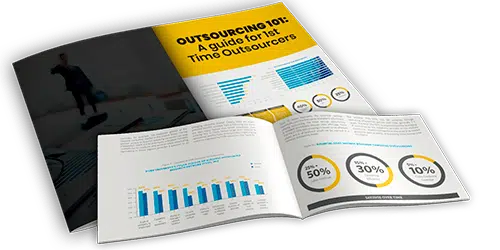Enterprises have long leveraged Business Process Outsourcing (BPO) to keep up with the modern business world’s break-neck pace. High-quality BPO not only boosts the productivity and efficiency of back office tasks but helps finance teams manage rapidly evolving technology and regulatory changes.
In the wake of COVID-19, outsourcing plans are accelerating faster than ever as organizations scramble to cut costs, increase agility, and focus on strategy by shifting their attention from non-core functions.
The BPO market is expected to grow by $105.5 billion between 2020 and 2024, at a rate of about 10% a year. As demand soars, so do the number of outsourcers – and many organizations struggle to cut through the noise and select the right partner for their business.
Here are 8 key considerations for choosing an outsourcing partner who will set your business up for success.
What to look for when choosing a BPO provider
Tip #1: High NPS scores prove high customer satisfaction.
Every outsourcer promises exceptional customer service. Yet horror stories abound, such as “black box” operations that give clients little visibility or control.
Net Promoter Scores (NPS) represent the core measurement of customer experience worldwide. Unlike handpicked references, they are compiled from surveys that measure the willingness of customers to recommend products or services.
Ask potential partners for their NPS score as a trustworthy gauge of service quality. Challenge them to explain low scores.
Tip #2: High-touch services matter – especially for first-time customers.
Outsourcing is a major transformation initiative – especially for customers starting a journey. Finding a partner who prioritizes your business, delivers on your unique objectives, and executes within promised timelines is critical to “outsourcing done right.”
Outsourcers with a value proposition predominantly focused on the labor arbitrage in Asia must shoehorn customers into cookie-cutter solutions to maintain bottom-of-the-barrel pricing. But while that inflexibility may work for giant-sized corporations – where even small productivity gains can translate to significant cost savings – it’s less beneficial for other businesses.
Middle-market organizations can maximize outsourcing success by selecting high-touch partners who tailor solutions to each client. These outsourcers take the time to understand a business’ unique situation – exploring your technology landscape, industry, regulations, global presence, and more. They are experts in best practices and pitfalls that may arise – and they will walk you through what needs to be done to achieve desired results.
They also offer the flexibility to customize hybrid solutions, allowing finance executives to retain ownership of certain processes within a function. For instance, a CFO who prefers to keep direct customer interactions in-house can retain Collections when outsourcing Accounts Receivable.
Tip #3: Make sure your partner has a strong transition plan to avoid gaps in service.
Realizing the true value of outsourcing rests upon your outsourcer’s ability to execute a successful transition. Get this wrong and it chips away at the realization of your business case. It can also significantly impact operations – for instance, gaps in Accounts Payable service can disrupt supply chains.
To ensure a smooth transition, dig into the details of a potential partner’s methodology. Exceptional outsourcers will have a structured approach for seamlessly migrating business processes, following key steps like assessment, documentation, process maps, and identifying controls.
Look for governance that ensures the transition progresses but isn’t rushed. It’s not unusual for a high-quality outsourcer to spend 18+ hours on a current-state operational walk-through of a single process.
It’s also important to select vendors with the expertise to design and implement best-in-class process improvements like automation, organizational changes, or streamlined steps. After all, migrating a poorly functioning process without plans to improve it only leads to an inadequate process performed elsewhere.
Tip #4: Choose outsourcers committed to automation from the start.
Nearly 60% of organizations consider access to new technology essential to BPO, allowing them to benefit from the latest innovations without major investment. But nearly 60% also say their current BPO provider ineffectively provides technology solutions that meet their needs.
Gartner reports that finance leaders consider 89% of accounting activities highly automatable, eliminating labor costs on repetitive, high-volume work and eradicating human error.
But while big-name outsourcers may dangle automation in a long-term strategy, it’s rarely part of their initial approach because it cannibalizes long-term revenue from their BPO practice. Picking a partner who includes automation in their outsourcing value proposition creates the best solution for a client from the start.
Tip #5: Look for partners with a true “extension of your team” mentality.
Some BPO providers nickel and dime organizations for work that falls outside contractual Service Level Agreements (SLAs). But exceptional outsourcers are true business partners – creating customized, collaborative solutions that function as extensions of in-house teams.
Choose outsourcers who honor the “spirit of the agreement,” ensuring the service they deliver achieves desired results without extra costs. Exceptional partners will also leverage their visibility into operations to spot business opportunities and concerns.
For instance, an Outdoor gear and Clothing e-Commerce company experienced an unexpected sales boom due to COVID. Auxis as their outsourcing partner was able to mobilize quickly and scale its Accounts Payable operations. Without the ability to pay suppliers fast enough, the client would have struggled to fulfill orders and missed out on booming demand.
Tip #6: Consider a nearshore solution to avoid delivery problems in Asia.
Nearshore solutions resolve much of the growing dissatisfaction with Asian-based outsourcing models. Many executives are reconsidering their outsourcing strategy as they realize the substantial risks that follow Asia’s low labor costs, including challenging language barriers, unforeseen cultural differences, many “black box” operating models, alarmingly high turnover, and significant time zone differences that negatively impact communication and responsiveness.
COVID-19 also spotlighted the weak infrastructure and limited internet accessibility that impact service delivery in Asian locations like India and the Philippines. In contrast, nearshoring to top-tier locations in Latin America mitigates outsourcing risk with a modern infrastructure that enabled a seamless transition to a remote workforce.
Nearshoring to Costa Rica, for instance, still delivers a significant 30-50% labor arbitrage compared to the U.S. It gives companies access to a highly educated workforce that already performs back office work for 170+ multinational organizations. And it drives collaboration and high-performance with time zone compatibility, a westernized culture, and strong English fluency.

Tip #7: Seize the opportunity to improve visibility and control.
Most finance executives lack visibility into their organization’s health. Outsourcing provides an opportunity to improve insight – boosting productivity and operational control.
Look for outsourcers who establish continuous reporting metrics beyond contractual SLAs at the start of a relationship – and leverage KPI reporting to monitor process and business performance. Partners with robust business intelligence capabilities can also help establish dashboards that take a “real-time” pulse of the business.
Strong reporting metrics prevent cost creep in retained organizations and show middle management the value of an effective back office operation. It also provides easy access to the data finance teams need to design fit-for-purpose reports.
Tip #8: Don’t overlook the importance of change and talent management.
McKinsey estimates that a whopping 70% of change programs fail to achieve their goals – and employee resistance is a top factor. Unfortunately, announcing a decision to outsource is likely to put current employees on edge. Outsourcing will also disrupt the execution of business tasks and your organizational culture.
A well-planned change management program is critical to successful outsourcing. Your provider should be skilled at crafting communication and strategy that minimizes business disruption and uncertainty, fatigue, and stress on your staff.
Talent management expertise is another key capability. Outsourcing transactional tasks presents an opportunity to re-skill employees to focus on more strategic activities. Look for outsourcers who can help you plan what your future organization should look like and the type of activities it should perform.
Build a Modern Finance Organization with the right BPO partner
In the post-pandemic economy, finance teams must shed their traditional number-crunching role and evolve into true strategic partners to their business.
Outsourcing transactional tasks to the right provider delivers value beyond initial cost savings. By understanding the qualities that separate top-tier BPO partners from the rest, your organization can gain access to the tools, improvements, support, and expertise that will transform it into a Modern Finance Organization.
